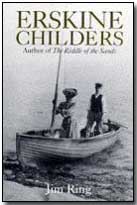Prose & Poetry - Erskine Childers
 Erskine Childers
(1870-1922), the author of a popular pre-war adventure novel concerning a
German invasion of Britain, served with the Royal Navy during World War One
before becoming involved in Irish politics as an Irish republican following
the war.
Erskine Childers
(1870-1922), the author of a popular pre-war adventure novel concerning a
German invasion of Britain, served with the Royal Navy during World War One
before becoming involved in Irish politics as an Irish republican following
the war.
Born in London in February 1870 Childers was brought up in Annamoe in County Wicklow at his cousin's home before being educated at Haileybury and at Trinity College, Cambridge.
In 1894 he took up employment in the House of Commons as a committee clerk before taking up a career in the British army, during which time he served in the South African War of 1899-1902, being wounded in 1900.
A skilled yachtsman Childers published in 1903 a fictional account of a planned German invasion of England, The Riddle of the Sands. In a current climate of fear concerning a potential surprise German attack Childers book became an instant bestseller and may even have informed subsequent naval reaction.
The following year, 1904, Childers married Marry Ellen Osgood of Boston; six years later he resigned his work at the House of Commons to concentrate instead on political work, and in particular on his developing interest in Irish Home Rule politics.
On 26 July 1914 - in the midst of the European pre-war July Crisis - Childers sailed into Howth in his own yacht, the Asgard, bearing 900 rifles and 14,000 rounds of ammunition, supplied from Germany by a representative of the Irish Volunteers.
Despite his belief in the cause of Irish Home Rule Childers nevertheless signed up with the Royal Navy for the duration of World War One; in 1916 he was awarded the DSO medal. The armistice brought Childers' demobilisation from the navy and re-entrance to Irish politics, this time as a fully-fledged republican.
Returning to Dublin therefore in March 1919 he joined Sin Fein, working with the party to secure a hearing for Ireland at the planned Paris Peace Conference.
In 1921 Childers was elected to the Dail Eireann as TD for County Wicklow; in March that year he was appointed Dail Minister for Publicity and editor of the Irish Bulletin, a republican newsletter.
A principal secretary in the Irish peace delegation to London in late 1921 Childers himself strongly opposed the terms of the proposed treaty. In the ensuing Irish Civil War he supported the republican IRA and was appointed the latter's Director of Publicity.
While visiting his cousin's home in County Wicklow in November 1922 Childers was arrested by Irish Free State troops and imprisoned in Wicklow Jail before being transferred to Portobello Barracks in Dublin where he was tortured. Court-martialled on 17 November on a charge of possession of a revolver given to him by Michael Collins, he was consequently sentenced to death.
An appeal pending in the High Court, Childers was nonetheless executed by firing squad in Portobello Barracks on 24 November 1922.
Among Childers' other published works were The Framework of Home Rule (1911), Military Rule in Ireland (1920) and The Constructive Works of Dail Eireann (1921).
Download "The Riddle of the Sands" (Project Gutenberg Text)
A "listening post" was an advanced post, usually in no-man's land, where soldiers tried to find out information about the enemy.
- Did you know?
